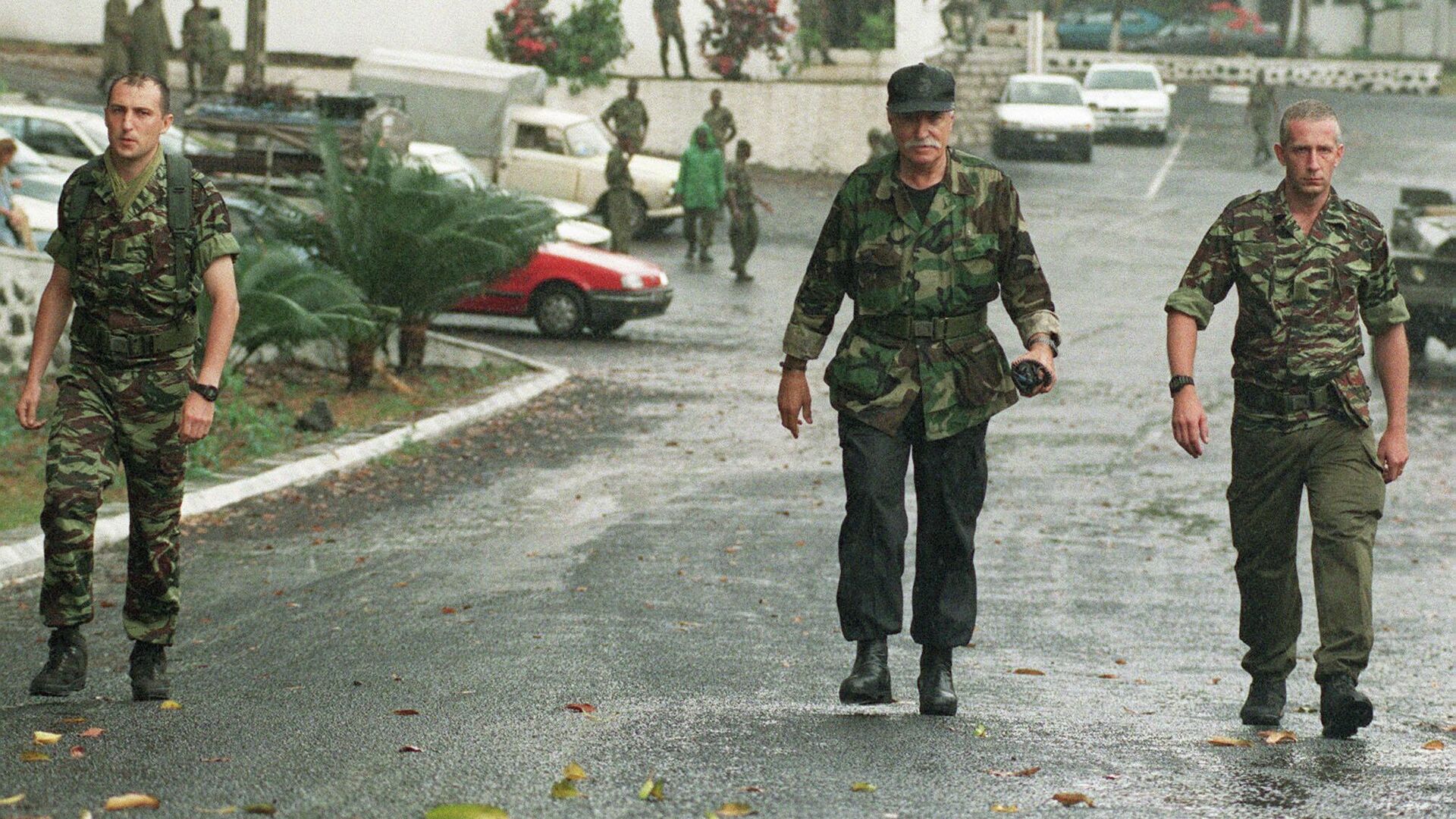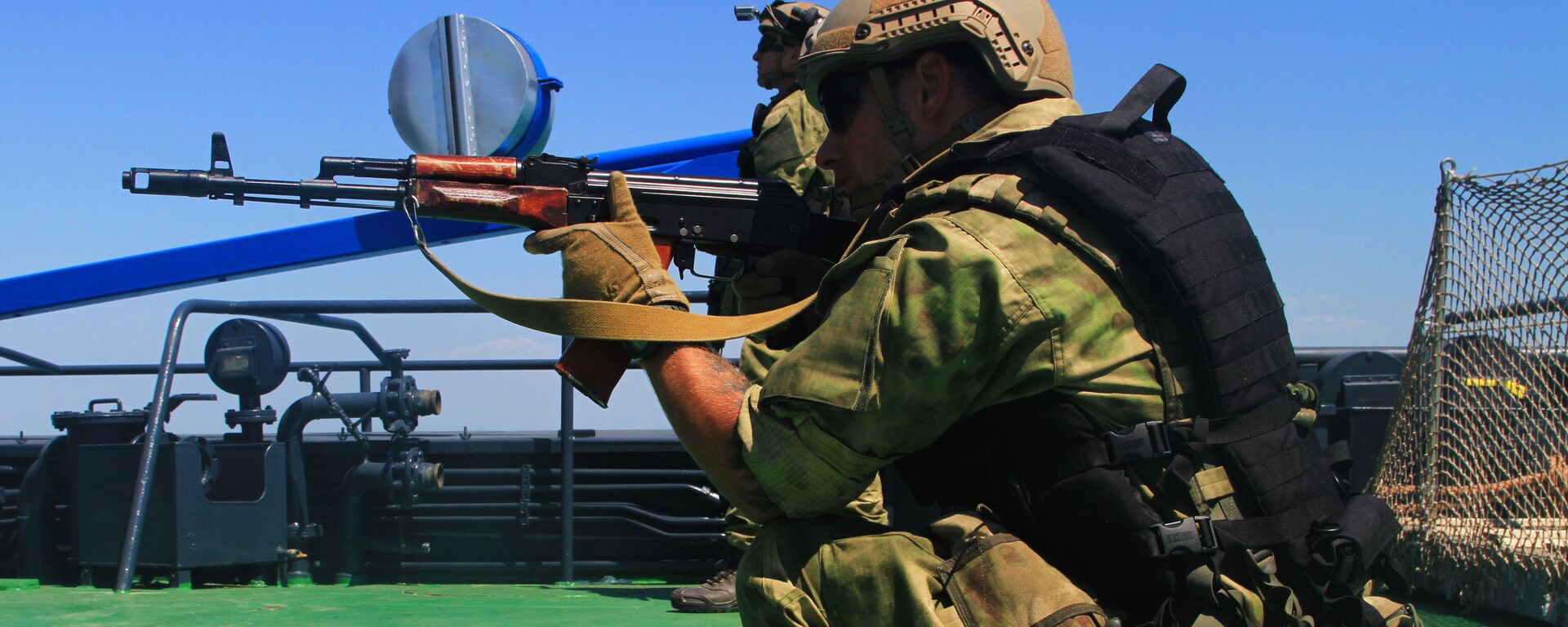https://en.sputniknews.africa/20230820/expert-explains-story-of-west-trained-mercs-destabilizing-role-in-disobedient-africa-1061475965.html
Expert Explains History of Western-Trained Mercs' 'Destabilizing' Role in 'Disobedient' Africa
Expert Explains History of Western-Trained Mercs' 'Destabilizing' Role in 'Disobedient' Africa
Sputnik Africa
A military and diplomatic source leaked to Sputnik on Wednesday that the UK MI6 foreign intelligence service had prepared a sabotage squad of 100 members of... 20.08.2023, Sputnik Africa
2023-08-20T19:13+0200
2023-08-20T19:13+0200
2023-08-20T19:21+0200
west
france
opinion
africa insight
united states (us)
kenya
east africa
south africa
southern africa
united kingdom (uk)
https://cdn1.img.sputniknews.africa/img/07e7/08/14/1061477313_0:152:2010:1283_1920x0_80_0_0_ff53e6609e1d24c887225afb028fc18a.jpg
The practice of governments training mercenary contingents to interfere in the affairs of African countries is not new and has been used by Western governments since the last century, Ian Liebenberg, professor in politics at the University of Namibia, told Sputnik Africa.The expert's remarks came amid reports that the British intelligence agency MI6 is training Ukrainians for interventions in Africa, which the expert called "plausible." According to Liebenberg, it is "naive" to believe that such "manipulative policies" by the West towards Africa will not continue as was done in history.The pundit argued that the main trigger for the intervention of the Western powers is the African countries' lack of "loyalty and obedience" to them.Liebenberg recalled the Kenyan liberation struggle (1952-1960) where the United Kingdom trained people to "resist" the movement of liberation.In addition, the expert brought in the example of the Angolan war, in which the United States was involved.The US, along with other Western powers, supported the liberation movement in Angola, which turned out to be "nothing but a clientele movement or client movement of the West, the UNITA, and supporting them to destabilize Angola to ensure that there is not a government in Angola that would be opposed to the West," the professor added.The expert also recalled France's involvement in Western and Central Africa, where Paris "often played a destabilizing role" when a local government disobeyed French policy and acted against individual leaders.For example, as Liebenberg noted, the French intelligence services were very actively involved in the assassination of Patrice Lumumba, the first prime minister of the DR Congo, and support for Moise Tshombe, who took the post later.Another illustration of French interference in African affairs, revealed by the professor, is the case of Thomas Sankarou, in the 1980s, who, with French support, participated in a coup d'état in Burkina Faso and was killed in the process.Such indirect actions may include economic pressure, the professor believes. He gave the example of Namibia and South Africa, which are now being pressured economically by the United States and the UK over "their position towards Russia in terms of the Ukraine conflict."South Africa's neutral position between Russia and the West on the Ukrainian conflict, as South African President Ramaphosa stressed in May, has become fuel for "extraordinary pressure" on Pretoria to pick one side or the other.Liebenberg stressed that the US pressure is becoming "particularly aggressive by moving steadily eastwards by means of a NATO containment strategy, which resembles what happened in the Cold War, namely containment of the Soviet Union."
https://en.sputniknews.africa/20230816/1061388060.html
west
france
united states (us)
kenya
east africa
south africa
southern africa
united kingdom (uk)
ukraine
angola
Sputnik Africa
feedback@sputniknews.com
+74956456601
MIA „Rossiya Segodnya“
2023
Maxim Grishenkin
https://cdn1.img.sputniknews.africa/img/07e7/0a/17/1063018107_0:0:1104:1103_100x100_80_0_0_03090c85a11f5d2e8a19cf1d989443c9.jpg
Maxim Grishenkin
https://cdn1.img.sputniknews.africa/img/07e7/0a/17/1063018107_0:0:1104:1103_100x100_80_0_0_03090c85a11f5d2e8a19cf1d989443c9.jpg
News
en_EN
Sputnik Africa
feedback@sputniknews.com
+74956456601
MIA „Rossiya Segodnya“
Sputnik Africa
feedback@sputniknews.com
+74956456601
MIA „Rossiya Segodnya“
Maxim Grishenkin
https://cdn1.img.sputniknews.africa/img/07e7/0a/17/1063018107_0:0:1104:1103_100x100_80_0_0_03090c85a11f5d2e8a19cf1d989443c9.jpg
west, france, africa insight, united states (us), kenya, east africa, south africa, southern africa, united kingdom (uk), ukraine, angola
west, france, africa insight, united states (us), kenya, east africa, south africa, southern africa, united kingdom (uk), ukraine, angola
Expert Explains History of Western-Trained Mercs' 'Destabilizing' Role in 'Disobedient' Africa
19:13 20.08.2023 (Updated: 19:21 20.08.2023) A military and diplomatic source leaked to Sputnik on Wednesday that the UK MI6 foreign intelligence service had prepared a sabotage squad of 100 members of Ukrainian nationalist and neo-Nazi formations to be sent to Africa on missions against Russian-friendly governments.
The practice of governments training mercenary contingents to interfere in the affairs of African countries is not new and has been used by Western governments since the last century, Ian Liebenberg, professor in politics at the University of Namibia, told Sputnik Africa.
The expert's remarks came
amid reports that the British intelligence agency MI6 is training Ukrainians for interventions in Africa, which the expert called "plausible."
According to Liebenberg, it is "naive" to believe that such "manipulative policies" by the West towards Africa will not continue as was done in history.
The pundit argued that the main trigger for the intervention of the Western powers is the African countries' lack of "loyalty and obedience" to them.
"The whole idea is to get non-pliant states, i.e., states that are not showing their loyalty and obedience to the US, the UK and France, to always be in the sights and the measures of pressure depends on them," the analyst explained.
Liebenberg recalled the
Kenyan liberation struggle (1952-1960) where the United Kingdom trained people to "resist" the movement of liberation.
In addition, the expert brought in the example of the Angolan war, in which the United States was involved.
"It's well known that the US funded part of the excursions of South Africa and others into Angola in 1975 after the coup d'état, and that the Angolan war, the early phases, 1975-1976, saw CIA support but also that mercenaries were involved," Liebenberg noted.
The US, along with other Western powers, supported the liberation movement in Angola, which turned out to be "nothing but a clientele movement or client movement of the West, the UNITA, and supporting them to destabilize Angola to ensure that there is not a
government in Angola that would be opposed to the West," the professor added.
The expert also recalled France's involvement in Western and Central Africa, where Paris "often played a destabilizing role" when a local government disobeyed French policy and acted against individual leaders.
For example, as Liebenberg noted, the French intelligence services were very actively involved in the assassination of Patrice Lumumba, the first prime minister of the DR Congo, and support for Moise Tshombe, who took the post later.
Another illustration of
French interference in African affairs, revealed by the professor, is the case of Thomas Sankarou, in the 1980s, who, with French support, participated in a coup d'état in Burkina Faso and was killed in the process.
"In other words, if the not pliable leaders step outside the Western prescription, i.e. the French or the UK or the US, they become discardable, and they are removed either by direct involvement, but in most cases by indirect involvement, which could be anything, could start with soft measures like economic pressure, could lead to a coup, could include assassinations," the expert argued.
Such indirect actions may include economic pressure, the professor believes. He gave the example of Namibia and South Africa, which are now being pressured economically by the United States and the UK over "their position towards Russia in terms of the Ukraine conflict."
South Africa's neutral position between Russia and the West on the Ukrainian conflict, as South African President Ramaphosa
stressed in May, has become fuel for "extraordinary pressure" on Pretoria to pick one side or the other.
Liebenberg stressed that the US pressure is becoming "particularly aggressive by moving steadily eastwards by means of a NATO containment strategy, which resembles what happened in the Cold War, namely containment of the Soviet Union."
"They are following the same recipe and needless to say, it is creating higher tension on various levels. How this will pan out only the future will tell," the professor concluded.



